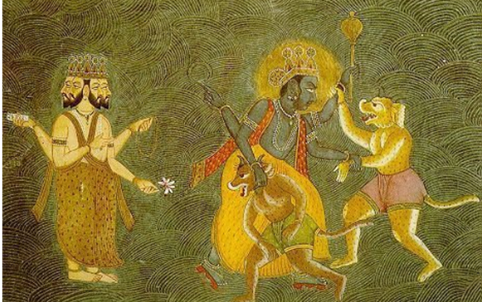6.VaranamAyiram, (Thousand Elephants)
Mattalamkotta varisangamninrooda
Muttizhai daamam niraindazhnda pandarkIzh
Maittunannambi madhusoodanan vandu yen
Kaittalampatraa kanaakandentozhi naan

Mattalamkotta = Mridangam and other Mangala Vadyams are blowing, varisangamninrooda = stripped conches were blown, Muttizhai = pearls, daamam =strings,niraindazhanda = fully covered with, pandarkizh = under the pendal, Maittunannambi = aunt’s son, madhusoodanan = Lord Vishnu who killed Madhu, vandu yenKaittalampatraa = Came and took my hand, kanaakandentozhi naan = so I saw the dream my dear.
English Poem
As auspicious sounds of Mridangam, white Conches blow
Astute pearls in bright white hang from wedding canopy
Touching the heads of the couple, aunt’s son, Madhu is
Taking my hand in His lotus hands, O dear, so I dreamt
Meaning
Even as the mridangam and mangalavayidyams are playing Kalyananadaswaram and the white Sankhams in a row are blowing auspicious sounds, the pearl strings are hanging from the pandals toughing the heads of Groom and bride, my aunt’s son, i.e., baavaMadhusudana has come and took my hand in His hand, So I dreamt my dear, Goda Devi said.
Also read: Sri Krishna stepping in style
Who is Madhusudana?
While she called Madhava in previous Pashuram, Goda in this Pashuram refers to Ranganatha as Madhusudana. What is special in this reference? The name MadhuSūdanais of two words, madhu + sūdana (slaying), meaning “slayer of madhu”.
As Lord Vishnu goes into Yoga Nidra and the whole universe is taking birth with his thinking, Brahmanda is being born, from the navel of Vishnu, a lotus is sprouted which further blossoms into a big flower on which Brahma is found sitting with four faces. Now it is the job of Brahma to contemplate further creation. As he does so, from the ear wax of Lord Vishnu, Madhu and Kaitabha were born. They are called Karna Shrotodbhava.
Also read: Yellow protective bonds on their hands
They worship Goddess MahaLakshmi who blessed them with a boon that they would get death whenever they wished. The power goes into their head and made them cruel demons. They stole Four Vedas from Brahma who was using it for continuing the creation. The demons have hidden Vedas deep inside the ocean. Brahma could not confront the two Rakshasas and seeks the help of Vishnu. But Vishnu was not getting up from his deep sleep. Realizing that the Lord slept for reasons of His own, Brahma decided to pray to Yoga-nidra, who is none other than Goddess Lakshmi herself in a special form to assist in the Lord’s yogic sleep. Mahalakshmi showed mercy on him and awakened the Lord. Brahma then explained Lord Vishnu the misdeeds of Madhu and Kaitabha and prayed Him to get him back the Vedas after destroying them.
Lord Viṣṇu fighting Madhu-Kaitabha
Lord Vishnu takes a peculiar form as Hayagriva, the beautiful horse incarnation, and fought with Madhu and Kaitabha, ultimately retrieving the Vedic scriptures.

Lord Viṣṇu as Hayagrīva restoring the Vedas to Lord Brahmā.
Though He defeated them for a while, He could not kill the demons because of the power of boons. Then Lord Vishnu praises the fighting skills of both the demons. They were pleased and asked “What boon do you want from us?” they asked. “We will give you anything You want.” Lord Vishnu asked them to give their lives to Him. Then they died instantly. Lord Vishnu has attained another name “Madhusudana”.
Takes away the ‘sweet’ ego
Madhusudana also means “He who defeats honey [madhu] in sweetness.” According to commentator SridharaSvami “False ego is as sweet as honey and resides in the heart of everyone, making one forget his own identity. It intoxicates everyone. He who destroys false ego with the torchlight of knowledge is called Madhusadana.” Hayagriva is considered the embodiment of entire knowledge whom Goddess Saraswati also worships. Saraswati has gifted the idol of Hayagreeva to Ramanuja, as She was pleased with his very appropriate interpretation of Upanishad sentences.
Also read: Indra descends to discuss Goda’s marriage
By extension, the word madhu has come to refer to both the bumblebee and Krishna. Just as bees tend to enjoy the honey ofthe lotus, Krishna enjoys the honey of His devotees’ love. Srila Rupa Goswami, the great Vaishnava saint of sixteenth century, uses this dual meaning of Madhusudana in Act Five of his devotional drama Vidagdha Madhava:
Also read: Groom Ranganatha Arrives: Nishchitartham
PremaSarovaram created in Vrindavan

Once, when Radha and Krishna were sitting together, a bee was disturbing Radharani by flying near Her. Krishna requested a friend to chase away the bee, and after finishing the task the friend came back proclaiming that madhu was gone. As the word can refer to either the bee or Krishna, Radharani “mistakenly” took it in the latter sense and began to cry, thinking Krishna was now gone. Even though She was right there in Krishna’s arms, She was totally gripped by vipralambha-bhava, the mood of separation, a level of divine love aspired for by advanced Vaisnavas. Seeing Radharani’s tears of love, Krishna also began to cry, and their tears mingled together to become the sacred pond known as PremaSarovara in present-day Vraja (Vrindavana).
Also read: Krishna arrives with 1000 elephants around




